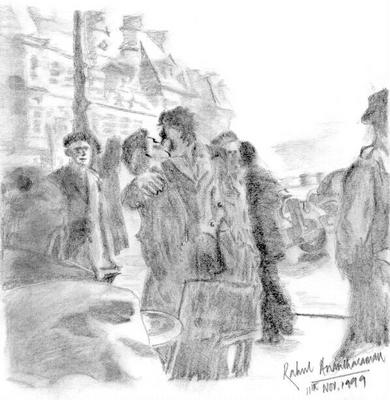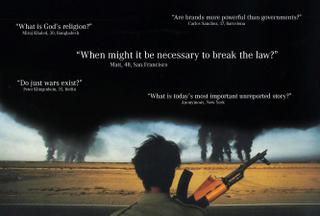
Wish all of you and your family a great and exciting new year.
I have been away from the blog over two months now, but hope to be back blogging on a regular basis henceforth (and no.. this is not my New Year's resolution).
Cheers!!!


A recurring theme of this plan is that business is not necessarily the enemy of nature, or vice versa. Traditionally the economy and the environment have not been described in lik eterms. The most watched economic statistics, such as Gross Domestic Product (GDP), do not measure resource depletion; they are essentially measures of cash flow rather than balance sheets of assets and liabilities. If you clear-cut a forest, GDP jumps even though you have wipes out an asset that could have bought in a steady stream of income.
More broadly, the prices we pay for goods and services seldom include the associated environmental costs. Someone else picks up the tab - and that someone is usually us in another guise. By one estimate, the average American taxpayer forks out $2,000 a year to subsidize farming, driving, mining and other activities with a heavy environmental footprint. The distorted markets gives consumers and producers litte incentive to clean up. Environmentalists inadvertently reinforce this tendency when they focus on the priceless attractions of nature, which are deeply meaningful but difficult to weigh against more pressing concerns. The Endangered Species Act has provided iconic examples of advocates talking past one another. Greens blamed th3 plight of spotted owls on loggers; the loggers blamed unemployment on self-indulgent orinthology. In fact, both were victims of unsustainable forestry.
In recent years, economists and evironmental scientists have come together to hang a price tag on nature's benefits. Far from demeaning nature, this exercise reveals how much we depend on it. The Millenium Ecosystem Assessment, published earlier this year, identified services - from pollination to water filteration - that humans would have to provide for themselves, at great cost, if nature did not. Of the 24 broad categories of services, the team found that 15 are being used faster than they regenerate.
When the environment is accounted for, what is good for nature is often what is good for the economy and even for individual business sectors. Fishers, for example, maximize their profits when they harvest fisheries at a sustainable level; beyond that point, both yeilds and profits decline as more people chase ever fewer fish. To be sure, life is always not so convenient. Society must sometimes make real trade-offs. But it is only beginning to explore teh win-win options.

 Yes, what is your question to the collective wisdom of the world?
Yes, what is your question to the collective wisdom of the world?dropping knowlege means dropping the assumption that we know all the answers. It means questioning the conventional wisdom. It means figuring out which questions are the most important to ask, sharing answers and then challenging those answers. We call the proctice of asking questions and sharing wisdom, dropping knowledge.
In his book "Globalized Islam," the French scholar Olivier Roy points out that today's jihadists have a lot in common with the left-wing extremists of the 1930's and 1960's. Ideologically, Islamic neofundamentalism occupies the same militant space that was once occupied by Marxism. It draws the same sorts of recruits (educated second-generation immigrants, for example), uses some of the same symbols and vilifies some of the same enemies (imperialism and capitalism).
Roy emphasizes that the jihadists are the products of globalization, and its enemies. They are detached from any specific country or culture, he says, and take up jihad because it attaches them to something. They are generally not politically active before they take up jihad. They are looking to strike a vague blow against the system and so give their lives (and deaths) shape and meaning.
This view is quite interesting and contrary to my view - posted as a comment to Sunil Laxman's post on the same topic.

Statistics is to engineers, like lamp-posts are to drunks - they are used more for support than for illumination.This got me thinking - where is statistics used for illumination? Before we proceed it would be worthwhile checking the definition of statistics given here.
What we havehere is a signal-to-noise problem. Humans evolved brains that are pattern-recognition machines, adept at detecting signals that enhance or threaten survival amid a very noisy world. This capability is association learning - associating the causal connections between A and B - as when our ancestors associated the seasons with the migration of game animals.
Unfortunately, the system has flaws. Superstitions are false associations - A appears connected to B, but it is not (the baseball player who doesn't shave and hits a home run). Las Vegas was built on associated learning.
..... - if you scan enough noise, you will eventually find a signal, whether it is there or not.
.....
We evolved as a social primate species whose language ability facilitated the exchange of such association anecdotes. The problem is that although true pattern recognition helps us survive, false pattern recognition does not get us killed, so the overall phenomenon has endured the winnowing process of natural selection. .... Anecdotal thinking comes naturally; science requires training.


The only reason I moved was that now I have my own office space rather than sharing it with 3 others.
Pootu vaitha oru vatta nila...
So goes a song from the movie tamil Idhayam. Roughly translated it is "A round moon with a bindhi". Tamil poets from the days of yore (this one by poet Vairamuthu),have tried to descibe the beauty of a tamil woman. A few constants in their descriptions -long hair decked with flowers, chandramukhi (woman with a face like the moon) and a pottu (bindi) smack in the middle of her forehead.
Yes, the pottu adds greatly to a woman's beauty, but why the red pottu and in that specific location? The red color and the location can be prefuncturily explained based on aesthetics. Red is a beautiful and bright color that contrasts well with the fair skinned aryan woman and symmetry requires the location specified earlier.
Is that all there is to it? Well , I think not. A key aspect of Hindu culture (I am specifically referring it to as culture rather than religion as I believe we muddled the two later on) is its symbolism. So here is my take on it......
The pottu is mainly red in color. Red color has the longest wavelength and can thus be seen the farthest (that is why the stop light is red!!!). Red also symbolizes fire... the fire of passion. When a girl is young, she wears the pottu to signify the passion in her. The question that could come up here is - Doesn't a man have passion? He certainly does, but our (rather our ancestor's) society, being as it was, allowed men to lay bare their passion - for education, women etc.
When the woman is married, she applies it to the top of her forehead where the hair starts. This is to indicate that her love is consummated or satisfied. It is a sort of warning sign to all other men who look at her. Also in some cultures, the woman cover her hair after her wedding. This is because the hair is black and black signifies that it accepts everything/everyone.
The color symbolism is so important in our culture. Another such symbolism is why widows wear white and their hair shorn. White as a color repels all light/colors. When a woman is clothed in white, she tells the wold that she is no longer an active participant..... I repel all of you.. all I have is within me.
Women these days barely wear the pottu. They ignore it as having religious connotations, which do not go well in this liberal, modern and hence civilized (so they say) world. Even the few who wear it, prefer black to red.
This is just one example of a religious symbol having no religious roots, rather a societal or cultural root. There are many more such examples. I wish people would stop to ask or think, why we (or our parents) do certain things the way we (or they) do and try to come up with rational explanations rather than accepting them on blind faith or rejecting them as being religious.
We don't give our ancestor's enough credit for being rational thinkers!!
Some people have got a mental horizon of radius zero and call it their point of view.Liked it!!
They point to the words Mr. Bush used to silence conservative critics of Attorney General Alberto R. Gonzales last week, warning them curtly, "I'm loyal to my friends."The Don stuck to his principles and faith and refused to go against it and so does President Bush. The biggest difference between these two characters (one fictional and the other not - unfortunately) is that the Don was prepared to accept his mistakes and that made him a better person.
"Our futures are shot to hell as soon as our parents bestow
upon us names that are anything but alluring. I cannot imagine a more foolproof way of making sure the child remains single till classified advertisements or that maternal uncle in San Francisco thinks otherwise. Name him "Parthasarathy Venkatachalapthy" and his inherent capability to combat celibacy is obliterated before he could even talk. He will grow to be known as Partha. Before he knows, his smart, seductively named northy classmates start calling him Paratha. No woman in their right minds will go anyway near poor Parthasarathy. His investment banking job doesn't help either. His employer loves him though. He has no personal life you see. By this time the Sanjay Singhs and Bobby Khans from his class have small businesses of their own and spend 60% of their lives in discos and pubs. The remaining 40% is spent coochicooing with leather and denim clad muses in their penthouse flats on Nepean Sea Road. Business is safely in the hands of the Mallu manager. After all with a name like Blossom Babykutty he cant use his 30000 salary anywhere. Blossom gave up on society when in school they automatically enrolled him for Cookery Classes. Along with all the girls.
Yes my dear reader, nomenclature is the first nail in a coffin of neglect and hormonal pandemonium. In a kinder world they would just name the poor southern male child and throw him off the balcony. "Yes appa we have named him Goundamani..." THUD. Life would have been less kinder to him anyway."